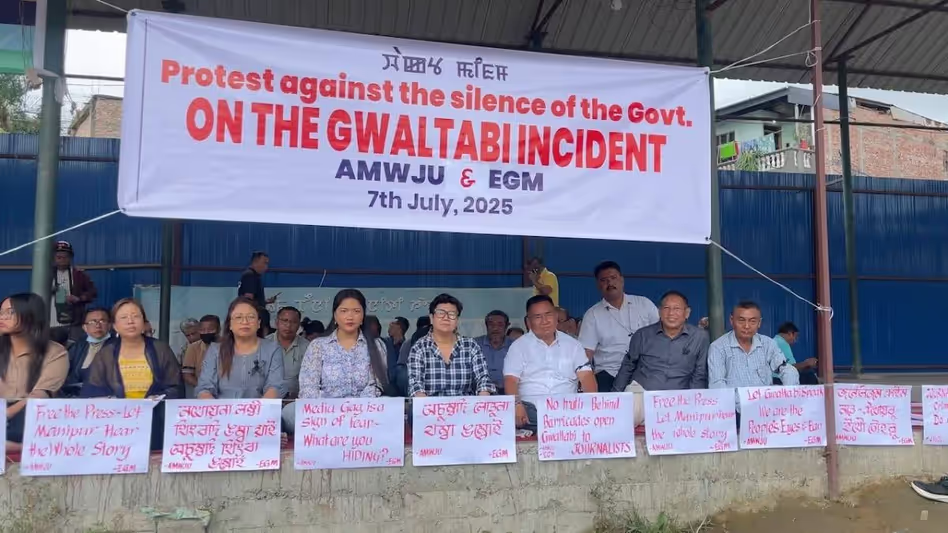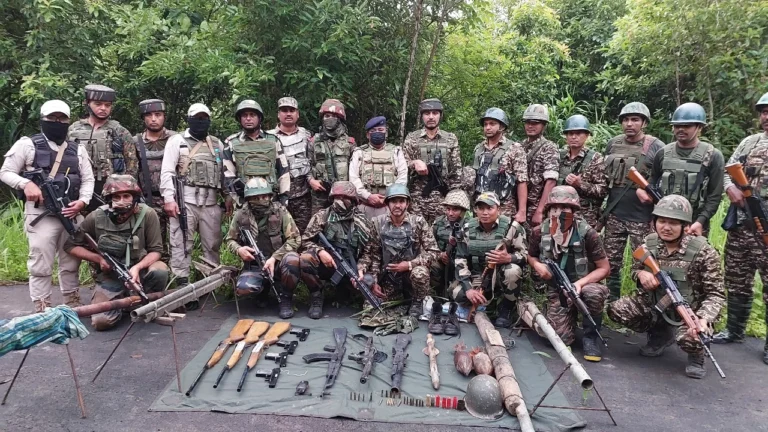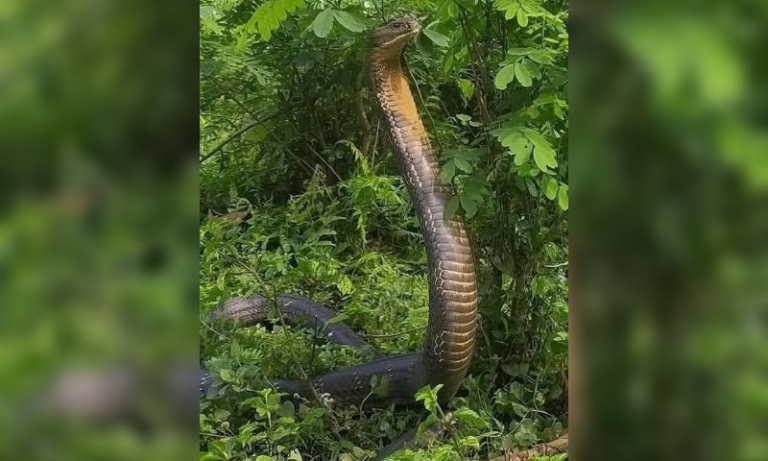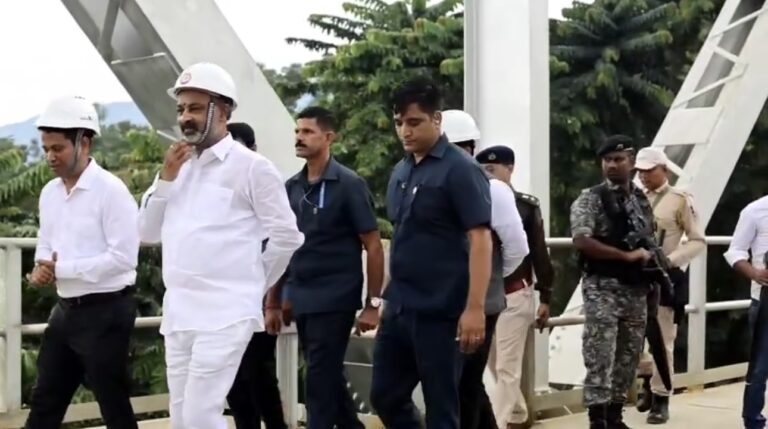Manipur Journalists’ Bodies Call Off Agitation After Government Assurance on Gwaltabi Incident
The All Manipur Working Journalists’ Union (AMWJU) and Editors Guild Manipur (EGM) have called off their agitation over the May 20, 2025 Gwaltabi incident after the Manipur government assured action: a two-member inquiry committee submitted its report on June 13, the recommendations were accepted, and departments and security agencies were directed to prevent a recurrence. The decision was taken at a joint AMWJU–EGM meeting at the Manipur Press Club, Imphal, with the bodies cautioning they’ll resume protests if assurances aren’t implemented.
Sometimes one moment captures a deeper tension that’s been simmering for months. In Manipur, that moment arrived at Gwaltabi checkpoint on May 20, 2025, when a Manipur State Transport (MST) bus ferrying journalists to cover the Shirui Lily Festival was allegedly stopped and told to hide the very word that defines them—“Manipur.” That image cut deep: not just a logistical hiccup, but a symbolic blow to identity and press freedom. Weeks of protests followed, led by Manipur’s two principal media bodies—AMWJU and EGM—until a series of official steps led them to call off the agitation on August 23, 2025.
The Government’s Response: Inquiry, Assurances, and a Pledge of Non-Recurrence
As outrage built, the state moved to constitute an inquiry and assure non-recurrence. The Chief Secretary publicly said there had been no official directive to conceal the state’s name and promised that such incidents would not happen again. An inquiry committee (two members) was formed; the report was submitted on June 13, 2025; and the government accepted the recommendations, issuing directions to departments and security agencies to prevent similar incidents in the future.
Those steps set the stage for the joint AMWJU–EGM meeting at the Manipur Press Club on August 23, 2025, where the unions formally called off their agitation after reviewing the government’s actions. Even so, they flagged “cautious optimism” and made it clear that press safety and dignity are non-negotiable. Translation: the protest is paused, not cancelled in spirit.
Why the Gwaltabi Incident Hit a Nerve
Let’s be honest—accidents and miscommunications happen. But the Gwaltabi flashpoint touched raw nerves for three reasons:
- Identity: Asking a state bus to hide “Manipur” is an affront to state identity and federal dignity, especially in a fragile environment.
- Press Freedom: The bus was carrying journalists on assignment. Blocking or humiliating a press convoy signals a willingness to curb information flows.
- Trust Deficit: The state has navigated waves of tension in recent years; incidents like this deepen the trust deficit between civil society, media, and security forces. Background discourse and op-eds in Manipur media made that point repeatedly.
From Outrage to Organization: How AMWJU and EGM Mobilized
What stood out in the aftermath wasn’t only anger—it was organization. AMWJU and EGM didn’t simply issue statements; they staged joint sit-ins, synchronized media actions, and kept the spotlight on the issue for weeks. Photographs from protests and sustained reporting helped keep the conversation alive.
That sustained pressure was backed by civil society groups and political voices seeking accountability. Petitions and RTI applications demanded clarity on who ordered what, and whether the chain of command was properly documented. The effect? A resolute push that ultimately extracted written commitments and official directions meant to prevent a repeat.
What the Inquiry and Assurances Mean in Practice
The two-member inquiry submitted its report on June 13; the government accepted its recommendations; instructions were issued to relevant departments and security agencies. Great—but what changes on the ground?
- Protocol Clarity: Security agencies need clear written SOPs that explicitly protect press movement and prohibit identity suppression (like covering “Manipur”). The Chief Secretary’s public assurance of non-recurrence is a start; SOPs make it real.
- Coordination Nodes: Press vehicles for official/state events should have pre-registered manifests and hotline contacts so checkpoint confusion can be resolved in minutes.
- Accountability Trail: If a directive appears to have been made without authorization, there must be a paper trail and consequences. The government’s acceptance of recommendations creates the basis for that accountability.
- Feedback Loop: Media bodies should have standing liaison meetings with administration and security leadership (monthly or quarterly), so grievances get addressed before they become flashpoints.
FAQs
Q1. What exactly did AMWJU and EGM demand after the Gwaltabi incident?
They sought an independent inquiry, written assurances, and enforceable directions ensuring the press can travel and report without symbolic or procedural harassment—especially the guarantee that state identity (like “Manipur” on official vehicles) isn’t suppressed. The government later accepted the inquiry recommendations and issued directions to departments and security agencies.
Q2. What did the government publicly assure?
The Chief Secretary stated there was no official directive to conceal the state’s name and promised non-recurrence. An inquiry was conducted, and its recommendations were accepted, with operational directions to ensure such incidents don’t happen again.
Q3. Why was the incident such a big deal if it happened only once?
Because it struck at identity (“Manipur” on a state bus) and press freedom (journalists on official duty). In fragile contexts, symbolic acts send loud messages. That’s why protests lasted weeks and drew broad support.
Q4. What changed after the unions called off the agitation?
Formally, the unions acknowledged assurances plus directions and returned to work. Substantively, the ball is now in the implementation court: checkpoint SOPs, training, and quick redress are the real tests. The unions said they’ll resume action if promises aren’t kept.
Q5. Is there a precedent for such government–media negotiations in Manipur?
Yes—Manipur’s media has repeatedly organized around issues of safety and access, with joint protests and petitions. This episode fits that pattern, but the explicit acceptance of inquiry recommendations and non-recurrence pledge make this a particularly important benchmark.






